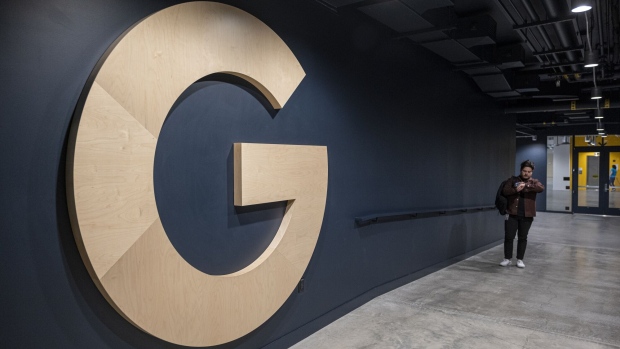Sep 27, 2023
Google Judge Told Android Contracts Blocked Upstart Search App
, Bloomberg News

(Bloomberg) -- Alphabet Inc.’s Google stymied the development of an upstart search app by invoking its exclusive revenue-sharing deals with Samsung Electronics Co., Verizon Communications Inc., AT&T Inc. and T-Mobile Inc., the founder of a tech startup told a judge.
“Time and again, the Google contract was the primary blocker for us distributing app search,” Alex Austin, founder of Branch Metrics, testified Wednesday during the US Justice Department’s antitrust trial in Washington against the tech giant.
The government claims Google uses such contracts with tech rivals, smartphone makers and wireless providers to illegally maintain its monopoly in online search, by making it the preselected option, or default, on PCs and mobile phones. Google denies the allegation and says users choose its search engine because it is the best one.
Founded in 2013, Branch Metrics raised $650 million from New Enterprise Associates Inc., Samsung Next Fund and other venture capital investors to build a search engine for mobile apps, the founder said. The company’s product would have directed users to information within apps already installed on their phone, Austin said. It was designed to help users discover new apps, he said.
Read More: Apple, Google Agreed to ‘Defend’ Search Deal From Regulators
After investing in 2015, Samsung sought to integrate the Branch product into its phones starting in 2019 with the S10 device, Austin said. But the phone maker restricted some of the functionality because of concerns about the Google contract, he said. The product was only allowed to search 25 apps and hid results from any apps not already installed on the phone, he said.
Austin said Samsung told him that Google’s revenue-share agreements required it be the only “web search engine” on a device. But in 2020, Google began to renegotiate those agreements, requiring that it be the “only connected search and internet search” on a device, he said.
After that, Branch was forced to revamp its product to focus only on searching apps already installed on a device, Austin said.
Under questioning by Google’s lawyers Thursday, Austin acknowledged that Samsung wrote in February 2021 that the smartphone manufacturer wanted to prioritize building out its own product, S-Finder, instead of working with Branch.
After that email, Austin said, Branch employees flew to Korea to speak in person about why Samsung pulled back.
The employees called to report back that “it’s Google and you never have any hope of getting past that,” Austin said. Samsung was “not going to document in any email exchange that it’s Google.”
Branch also had discussions with Apple Inc. about incorporating its product into the iPhone, but they ultimately didn’t move forward, Austin said.
Raising Concerns
Google executive Anna Kartasheva said she brought concerns internally in June 2020 about Samsung’s implementation of the Branch product. AT&T initially raised the issue, asking Google whether the Branch product would violate the revenue-share agreement, she said.
“We have allowed it everywhere, even on devices covered by search rev share deals because Samsung pointed to gaps in what Google Search was able to do with this type of search,” Kartasheva wrote in an email to Google’s search team. “We believe this goes beyond the scope of what we originally allowed Samsung (and US carriers) and have started pushing back on them.”
Kartasheva, who is involved in strategy for Android systems, testified that she was not the person who would decide whether the Branch product violated the terms of Google’s contracts, and was seeking more information from the search team about their views.
“Nobody started pushing back on Samsung,” she said. “None of us were decision makers.”
Read More: What’s at Stake in Google Trial on Antitrust Charges
Kartasheva took screenshots of the product that she shared in the email to other Google employees under the statement: “Situation: Samsung’s partnership with Branch expands the search experience via deep linking, violating their contracts.”
During her testimony before US District Judge Amit Mehta, who will decide the case, Kartasheva said she was sharing her opinion, but was never told what the ultimate decision was on Branch’s product or AT&T’s request.
Following her testimony, the Justice Department read aloud from a deposition by an AT&T executive, Jeff Ezell, about a potential partnership with Branch.
“Google indicated they felt it was inconsistent with the” revenue-share agreement, Ezell said in his deposition. “We decided it wasn’t worth it.”
After that, Ezell said, AT&T ended its discussions with Branch.
Google also read from Ezell’s deposition. “We weren’t really sure if that was a user experience they would want,” he said of Branch’s product.
The antitrust trial is in its third week and is expected to last into November.
The case is US v. Google, 20-cv-3010, US District Court, District of Columbia.
(Updates with additional testimony beginning in eighth paragraph.)
©2023 Bloomberg L.P.





